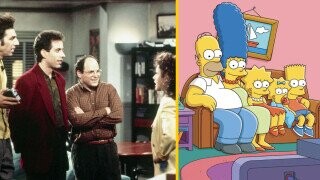'Seinfeld's Lack Of Empathy Has The Same Roots As 'The Simpsons'

Welcome to ComedyNerd, Cracked's daily comedy vertical. For more ComedyNerd content, and ongoing coverage of the Iran/Contra Affair, please sign up for the ComedyNerd newsletter below.
Amid Seinfeld's triumphant return to Netflix last month after a prolonged streaming hiatus, it seems the sitcom's absence has not only made our hearts grow fonder, with seemingly everyone and their mother binging and/or re-watching the series in droves, but its presence has also raised an ultra-existential question surrounding the show's morality – namely, “why is everyone on that show an absolute a-hole?”
Don't Miss
“Did Seinfeld the show (not the human) completely eradicate empathy from cultural consciousness or did it just show people that they had an unhealthy amount of things in common with people who had no empathy?” musician Keith Buckley mused in a now-viral tweet shared over the weekend. “Or neither? I just started from S1E1 and I already feel surly,” he continued.
Although the word “surly” perfectly exemplifies the experience of watching Seinfeld, it seems contrary to popular and apparent misconceptions, the beloved sitcom is not a lone force of evil, normalizing dumping our partners for petty reasons like eating peas one by one while setting a television precedent for series centering around certified douchecanoes like It's Always Sunny in Philadelphia and – dare I say it – The Office. No, reader, Seinfeld didn't start the fire. Instead, it represented a broader cultural shift, one depicted in several other peer sitcoms – more specifically, The Simpsons, which premiered just five months after Jerry, George, Elaine, and Kramer made their small-screen debut.
Throughout The Simpsons's roughly three-decade-long run, nearly every major character makes at least one horrific blunder, ranging from Ned Flanders attempting a guerrilla baptism of the Simpson children, to Mr. Burns stealing roughly $1 trillion in aid money, to Homer Simpson polluting Lake Springfield so, so badly that it forces the EPA to seal the entire community inside of a glass dome. While Seinfeld, on the other hand, is defined primarily by its status as a “show about nothing,” the characters' a-hole tendencies often shined through. From Jerry dumping his masseuse girlfriend for not giving him a free massage, to George pushing children and elderly people out of the way to escape a fire, the series is about a group of certifiable jerks – so much so, that the jerk store called to say they're running out of them.
Despite their major differences – namely, Seinfeld centering around the misadventures a group of selfish live-action a-holes, and The Simpsons centering around the misadventures of a group of selfish and animated a-holes (not much unlike the mythical butthole cut of Cats), their near-simultaneous emergences are indicative of a broader trend – the fact that seemingly everyone came out of the 80's a bit jaded.
You have the hippie-to-yuppie pipeline prompting some activists to jettison the values of the 1960's social movements in favor of making bank in several high-profit industries (usually those headquartered on Wall Street, as satirized in everyone's favorite ambiguously-ending black comedy, American Psycho). You have President Ronald Regan standing idly by amid the HIV/AIDS crisis, refusing to acknowledge the epidemic after until thousands had died (many of which belonged to the LGBTQAI+ community). Hell, you even have the emergence of the classic 80's d-bag, complete with mullets, popped collars, and mountains of a certain substance McGruff the Crime Dog sang about in an absolute banger that is now having its TikTok moment. Between these as well as several other factors, the '80s were at least partially defined by its apathy, seemingly setting the tone for decades to come.
In 2011, researchers at the University of Michigan at Ann Arbor found that empathy among young people had been on the decline since 1980, with college students self-reporting less and less empathy over the course of the three-decade-long study. One of the primary theories behind this change, according to researchers, has to do with the impacts of increased isolation. “In the past 30 years Americans have become more likely to live alone and less likely to join groups—ranging from PTAs to political parties to casual sports teams,” the Scientific American wrote of this finding at the time. “Several studies hint that this type of isolation can take a toll on people’s attitudes toward others.”
The other suspected catalyst behind this change pertains to a shift in media, namely a mass exodus of reading, which according to the publication, may be connected to caring for others. “The number of adults who read literature for pleasure sank below 50 percent for the first time ever in the past 10 years, with the decrease occurring most sharply among college-age adults,” the article continued, noting that "reading may be linked to empathy.”
So folks, although Seinfeld may be definitively “surly,” as Buckley put it, it seems it's more than just Jerry, and hell, the fine people of Springfield, Mystery State bringing about these social changes. Just like life imitates art, art imitates life.
For more internet nonsense, follow Carly on Instagram @HuntressThompson_ on TikTok as @HuntressThompson_, and on Twitter @TennesAnyone.
